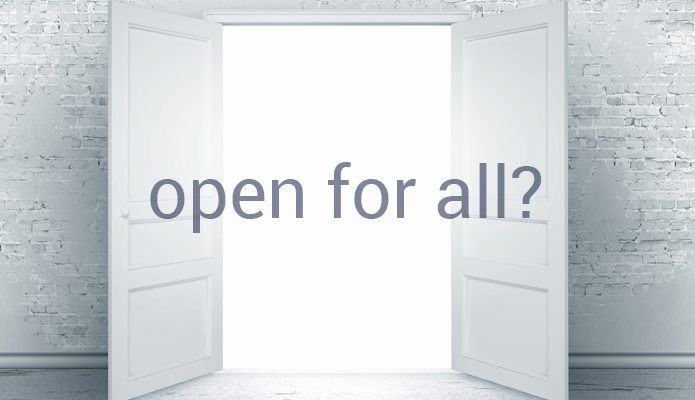The thinking of Comrade F. Dobler from the early 20th century remains relevant and even prescient: those who need open access to information may be those who are fundamentally excluded from public libraries.

Why Do Library Workers Not Have the Skills To Meet Community Needs?
The simple answer to this very Big Question is ‘because they are Library Workers’. In other words, they are trained in all of the aspects of providing library services, but they do not have the key skills that are required to identify, prioritize and meet community needs. We need a different kind of Library Worker who has a skill set which combines traditional library skills with the ability to build sustained relationships with the community. I call this new hybrid model the Community Development Worker. In this position description there would be a 20% focus on library skills and an 80% focus on community development.
Having a good rear view mirror is always useful but we also need to look forward through the windscreen. And we need to learn from the mistakes we have made in the past. So any future Workforce Development strategy for Public Libraries must recognize the need for Community Development skills. I am talking about a fundamental transformation here and not just a modernization or greater use of technology. I am saying that we need to change the attitudes and behavior of our staff as part of a broader culture shift from a Traditional to a Community-Led and ultimately a Needs-Base paradigm.
The basis of all cultures is language and so we need to change the language if we are going to shift the culture. This means new Job Titles and Position Descriptions. It means that we should abandon old labels like Adult, Children’s and Reference and replace them with new brands such as Lifelong Learning, Inclusion and Diversity. It means repositioning the Library and the Library Worker within the wider environment of Community Development and Social Change. So let’s take a look at Ontario’s latest attempt to shift the Public Library culture through Workforce Development.
An Environmental Scan of the Culture Sector (2016) was prepared for the Ontario Ministry of Tourism, Culture and Sport by Communications MDR. This Ontario Culture Strategy Background Document identified the need to invest in the Cultural Sector Workforce and looked at some good practice in education and training, digital skills and leadership. It identified some examples of Workforce Development in Ontario, in other parts of Canada and in other countries.
Investing in the Culture Sector Workforce
Investing in the culture sector workforce, whether business, technical, or creative professionals, ensures that they have access to skills they need to innovate, seize business opportunities, and design and deliver digital products and services to the public.
The Ontario Arts Council’s strategic plan prioritizes strengthening skills, capacity building, and sharing knowledge among Ontario’s artists and arts organizations. Objectives include ensuring that artists and other arts professionals have access to learning opportunities and convening, connecting, and promoting collaboration within the arts community.
Education and Training
Several Canadian jurisdictions have culture policies to encourage careers in the culture sector, strengthen the sector’s competitiveness, and build future demand for cultural goods.
New Brunswick cites increased recognition and support for artists as one of the key goals of its policy, to be achieved by identifying, supporting, and promoting professional development through education and training opportunities for professional artists.
Digital Skills
Developing digital skills allows creative individuals and companies to seize new business and creative opportunities.
Australia’s creative industry strategy recognizes the importance of creative and digital skills in creating a more innovative workforce and provides three national initiatives designed to improve digital skills in the sector. The Workforce Innovation Program supports digital skills development through creative industry associations.
Leadership
Leadership and succession planning continue to be an important issue in the culture sector.
In 2013, the Ontario Museum Association (OMA) launched the museumsuccession project to enable organizational capacity-building, enhance governance models, encourage career and professional development, and support planning for sustainability and leadership. A key component of the program provides training and resources to help museum professionals develop skills to meet the challenges facing the sector and ensure smooth leadership transition.
This is an environmental scan of the cultural sector and so it is not specific to public libraries. It is also necessarily high level and broad brush. It seeks to identify good practice rather than make suggestions or recommendations. It is ‘Show and Tell’ rather than ‘This is what you need to do.’ But my major criticism is that it very light on content and doesn’t really suggest anything new or different. There is nothing here that is going to shift the Public Library culture of comfort and complacency.
I have a problem with the big focus on Digital Skills, as if this is going to be the silver bullet or panacea that will solve all of our problems and make us fully socially inclusive over night. Don’t get me wrong, I understand the important role that technology can play in supporting and delivering library services – but it can only ever be a means to an end and not an end in itself. It is easier, and far more comfortable, to install a new piece of technology than to challenge and shift staff attitudes and behaviors.
I was disappointed to find that community needs are mostly absent from this environmental scan. They do get picked up under Leadership – ‘to increase arts leadership skills to enhance leaders’ understanding of their communities’ – but as Karl Marx once famously pointed out, understanding society is not enough – we must also seek to change it.
John Pateman is the CEO / Chief Librarian of the Thunder Bay Public Library. The Open for All? column explores the nature of libraries and their commitment to openness.
This Post Has 2 Comments
Comments are closed.

[…] Read more at OPEN SHELF. […]
Well, much of the Internet is down today but my books are all working.
http://www.usatoday.com/story/tech/2016/10/21/cyber-attack-takes-down-east-coast-netflix-spotify-twitter/92507806/